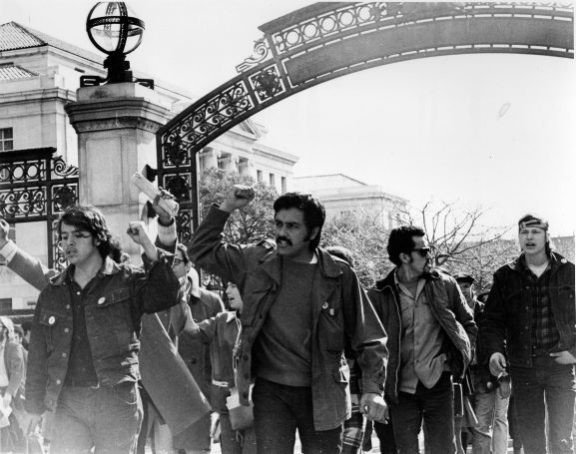The demands of the 1969 Third World Liberation Front Strike at the University of California, Berkeley, raised emotions and sparked intense conversation on April 24–27 of this year.
Commemorating the 50th anniversary of the TWLF student-led protest, the event allowed the public, as well as current and former students, to engage in an issue for those who originally led the strike — “Whose University?”
The student-led protest was a groundbreaking movement which led to the establishment of the Third World College at the university, which is known for the collaboration in the studies and diasporas of Indigenous/Native Americans, African-Americans, Asian-Americans and Latinx/Chicanx-Americans.
Former leaders and students involved in the strike gathered on April 27 in the center of the Sylvia Mendez Elementary School Auditorium to discuss “All Power to the People,” and what actions were needed to ensure Ethnic Studies remains a part of the university and learning objectives for all students.
Some of the well-known strikers — Dr. Harvey Dong, Dr. LaNada War Jack, and former Oakland Mayor Jean Quan and her husband Dr. Floyd Huen — were present for the events. Some expressed concern surrounding the current Ethnic Studies Department at UC Berkeley and understanding self-determination.
“We have to learn how to go back before we go forward,” co-founder and organizer for Indian People Organizing for Change, Corrina Gould, said.
As a Chochenyo and Karkin Ohlone, Gould urged the group to reevaluate what the fight for Ethnic Studies meant. Her opening address gave homage to the Natives whose land was taken by settler colonialists, and brought attention to the importance of ethnic studies as an area of study within the university.
Much of the information Gould shared was not known to many of the students who attended, nor widely understood in the local community. Namesake families in the Bay Area, like Peralta and Vallejo, were settler colonists who received land grants by Spain to steal Native lands, Gould said. The conversation went deeper to understanding the day-to-day exploitation of Native Californians.
“My tribe went to see the remains of our ancestors at UC Berkeley,” Gould said. “Fifteen hundred Native remains are still at UC Berkeley. My relatives’ remains are in drawers, disrespected to this day.”
Information about Native remains in museums and universities is not mentioned often, but they play a major part into why those who fought for the TWLF Strike feel their demands must be met.
“We are learning the same information in every class, and the information is more about regurgitation than learning with the material,” one UC Berkeley student said.
Many of the elders and graduates of the department expressed anger that the department has not been sustaining its legacy.
“Who will follow through with making Ethnic Studies a more thriving department? Why Ethnic Studies at Berkeley? Is there enough funding for Ethnic Studies?” one of the Elders asked. Specifically, they were concerned with the longevity of the department they worked so hard to have established.
“We should draft legislation for renaming it ‘Indigenous Studies,’ which would include everyone,” Dr. War Jack suggested.
The discussion then led to understanding why the original demands were not met by the university. The group was notified of the relationship between the UC Regents and the Governor’s office.
“This is a ‘country club’ between the two, a mission by the university to not bring back the ‘old Berkeley,’” one elder mentioned, referring to the time of mass protest and student unrest that fostered the movement and the department’s creation.
As the conversation came to a close, many agreed that the resistance to unkept promises by the university should be presented to the Cal Alumni Association. A suggestion of having CAA limit funding to UC Berkeley until these issues are addressed seemed to spark engagement of attendees.
All agreed there must be a mission to strengthen the pipeline between the university and the communities, and speak to the lack of attention to Ethnic Studies.
“Ethnic Studies is the antidote to trauma,” UC Berkeley graduate Dr. Xamuel Bañales said.


























